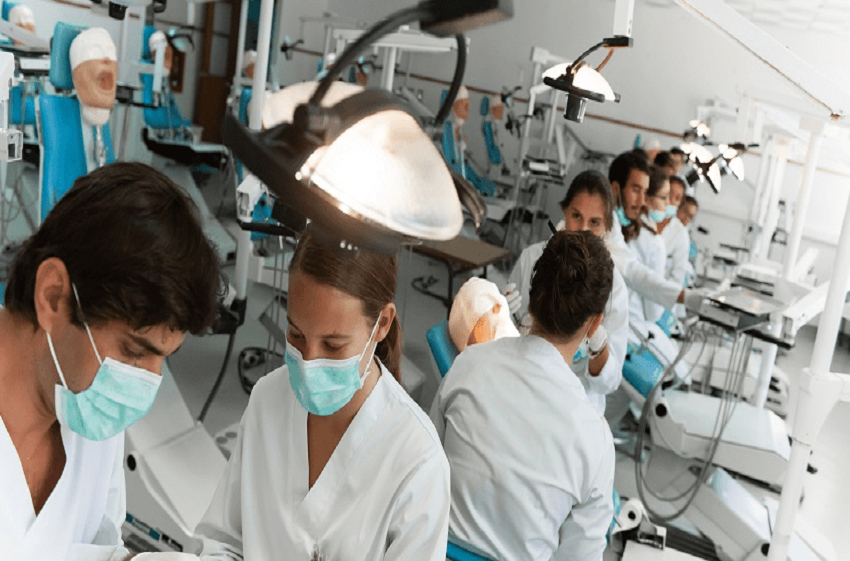Gum disease is a prevalent yet often overlooked condition that can have severe consequences if left untreated. While regular brushing and flossing are essential for maintaining good oral hygiene, visiting a dental clinic for professional care is equally important. In this blog, we will explore the critical role that dental clinics play in preventing and treating gum disease and how they collaborate with patients to ensure optimal oral health.
Analyzing Gum Disease
- What is Gum Disease?
Gum disease, or periodontal disease, is an infection of the tissues surrounding and supporting your teeth. It is primarily caused by the accumulation of plaque, a sticky film of bacteria that forms on the teeth. If not removed through proper oral hygiene, plaque can harden into tartar, leading to inflammation and infection of the gums.
Gum disease progresses in stages, starting with gingivitis, the mildest form, characterized by red, swollen, and bleeding gums. If left untreated, gingivitis can advance to periodontitis, where the gums pull away from the teeth, forming pockets that can become infected. Over time, the bone and connective tissue that hold the teeth in place can be destroyed, leading to tooth loss.
- Causes and Risk Factors
Several factors contribute to the development of gum disease, including:
– Poor Oral Hygiene: Inadequate brushing and flossing allow plaque and tartar to build up, leading to gum disease.
– Smoking: Tobacco use is one of the most significant risk factors for gum disease.
– Genetics: Some individuals are genetically predisposed to developing gum disease.
– Diabetes: People with diabetes are more susceptible to infections, including gum disease.
– Medications: Certain medications can reduce saliva flow, essential for protecting the gums.
– Hormonal Changes: Pregnancy, menstruation, and menopause can make gums more sensitive and prone to gingivitis.
– Poor Nutrition: A diet lacking essential nutrients can weaken the immune system and make it harder for the body to fight infections.
The Role of Dental Clinics in Disease Prevention
- Regular Check-Ups and Cleanings
One of the most effective ways to prevent gum disease is through regular dental check-ups and professional cleanings. Dental clinics in Ajman and across the UAE play a vital role in maintaining oral health by providing comprehensive dental care. During a routine check-up, a medical dentist will examine your gums for signs of disease and remove plaque and tartar that brushing and flossing may have missed.
Professional cleanings are essential because they reach areas difficult to clean at home, particularly below the gum line. Regular cleanings can prevent the progression of gingivitis to more severe forms of gum disease.
Educational Role
Dental clinics also serve an educational role in preventing gum disease. Dentists and dental hygienists provide valuable information on proper brushing and flossing techniques, the importance of a balanced diet, and the impact of lifestyle choices such as smoking on oral health. By educating patients, dental clinics empower individuals to take control of their oral care and prevent gum disease from developing in the first place.
Early Detection
Early detection of gum disease is crucial for effective treatment. Dental clinics are equipped with the tools and expertise to diagnose gum disease in its early stages, even before symptoms become apparent. Dental professionals can identify early signs of gum disease through regular check-ups and implement treatment plans to prevent further progression. Early intervention can save patients from more invasive and costly treatments in the future.
Collaboration with Patients
Home Care Advice
While dental clinics provide essential care, maintaining good gum health is collaborative between the dentist and the patient. Dental professionals offer personalized home care advice tailored to each patient’s needs. This may include recommendations on the best toothbrush and toothpaste, instructions on proper flossing techniques, and guidance on using mouthwash to reduce plaque.
Patients are encouraged to follow these guidelines diligently and schedule regular dental visits to monitor their progress. The collaboration between dental clinics and patients is key to preventing gum disease and ensuring long-term oral health.
Finding the Right Dental Clinic for You in UAE
Choosing the right dental clinic is essential for receiving quality care and preventing gum disease. Here are a few tips to help you find the right dental clinic in Ajman and the whole of UAE:
– Research: Look for clinics with experienced and qualified dental professionals who specialize in gum disease prevention and treatment.
– Reviews: Check online reviews and testimonials from other patients to gauge the clinic’s reputation.
– Technology: Choose a clinic with the latest dental technology for accurate diagnosis and effective treatment.
– Comfort: Ensure the clinic provides a comfortable and welcoming environment, especially if you experience dental anxiety.
– Location: Consider the clinic’s location and accessibility, especially if you require frequent visits for ongoing treatment.
Gum disease is a serious condition, but it is preventable and manageable with the help of dental clinics and proper home care. By prioritizing oral health and collaborating with dental professionals, you can protect your gums and enjoy a healthy smile for years.
FAQ
- What are the early signs of gum disease?
Early signs of gum disease include red, swollen, and bleeding gums, particularly when brushing or flossing. Bad breath and a persistent taste in the mouth can also indicate gum disease. If you notice any of these symptoms, visiting a dental clinic for a check-up is essential.
- How often should I visit the dentist to prevent gum disease?
Visiting the dentist every six months is recommended for a routine check-up and professional cleaning. However, if you have risk factors for gum disease, your dentist may recommend more frequent visits.
- Can gum disease be cured entirely?
Gingivitis, the early stage of gum disease, can be reversed with proper oral hygiene and professional treatment. However, once gum disease progresses to periodontitis, it cannot be cured entirely. Still, it can be managed with ongoing treatment and regular dental care.
- How can I maintain good gum health at home?
To maintain good gum health, brush your teeth at least twice daily with fluoride toothpaste, floss daily to remove plaque between teeth, and use an antiseptic mouthwash to reduce bacteria. Avoid smoking, eat a balanced diet, and schedule regular dental check-ups.

